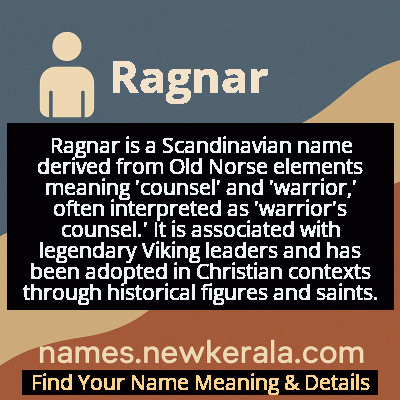Ragnar Name Meaning & Details
Origin, Popularity, Numerology Analysis & Name Meaning of Ragnar
Discover the origin, meaning, and cultural significance of the name RAGNAR. Delve into its historical roots and explore the lasting impact it has had on communities and traditions.
Name
Ragnar
Gender
Male
Origin
Christian
Lucky Number
5
Meaning of the Name - Ragnar
Ragnar is a Scandinavian name derived from Old Norse elements meaning 'counsel' and 'warrior,' often interpreted as 'warrior's counsel.' It is associated with legendary Viking leaders and has been adopted in Christian contexts through historical figures and saints.
Ragnar - Complete Numerology Analysis
Your Numerology Number
Based on Pythagorean Numerology System
Ruling Planet
Mercury
Positive Nature
Adventurous, dynamic, curious, and social.
Negative Traits
Restless, impatient, inconsistent, prone to indulgence.
Lucky Colours
Green, white.
Lucky Days
Wednesday.
Lucky Stones
Emerald.
Harmony Numbers
1, 3, 9.
Best Suited Professions
Sales, marketing, travel, entertainment.
What People Like About You
Versatility, charisma, adventurous spirit.
Famous People Named Ragnar
Ragnar Lodbrok
Legendary Viking King
Legendary Norse hero featured in sagas, known for raids on France and England
Ragnar Frisch
Economist
Nobel laureate who coined terms 'microeconomics' and 'macroeconomics'
Ragnar Nurkse
Economist
Developed 'balanced growth theory' in development economics
Ragnar Granit
Neuroscientist
Nobel Prize for discoveries concerning visual processes in the eye
Name Variations & International Equivalents
Click on blue names to explore their detailed meanings. Gray names with will be available soon.
Cultural & Historical Significance
In Christian contexts, the name was adopted and adapted, with its meaning evolving to represent 'strong counsel' or 'warrior's judgment,' blending pagan origins with Christian values of wisdom and guidance. The name appears in various medieval texts, including the Icelandic sagas and Anglo-Saxon chronicles, where Ragnar's descendants, known as the 'Great Heathen Army,' played significant roles in English history. This dual heritage makes Ragnar a name that bridges pre-Christian and Christian European traditions, representing both martial prowess and wise leadership.
Extended Personality Analysis
Individuals named Ragnar are typically perceived as strong-willed, independent, and natural leaders. They often exhibit a combination of strategic thinking and bold action, reflecting the name's meaning of 'strong counselor.' These individuals tend to be decisive in their approach to challenges and are not afraid to take calculated risks. Their leadership style often combines wisdom with action-oriented decision making, making them effective in crisis situations and long-term planning alike.
Ragnars are frequently described as having a commanding presence and innate confidence that inspires others to follow their lead. They value loyalty and tradition while also embracing innovation when it serves their goals. While they can be intense and determined, they also possess a strong sense of justice and fairness, making them respected figures in both personal and professional contexts. Their combination of mental acuity and physical presence makes them effective in positions of authority and influence, often excelling in fields that require both strategic planning and decisive action.
Modern Usage & Popularity
Ragnar has experienced a remarkable resurgence in popularity since the early 21st century, particularly following the massive success of the History Channel's 'Vikings' television series that premiered in 2013. The name has transitioned from being relatively obscure outside Scandinavia to gaining international recognition and appeal. In Nordic countries like Norway, Sweden, and Denmark, it maintains steady traditional popularity, while in English-speaking countries it's increasingly chosen by parents seeking strong, historical names with Norse heritage. According to naming statistics, Ragnar saw a 300% increase in usage in the United States between 2010 and 2020, though it remains outside the top 1000 names. The name appeals to modern parents looking for distinctive yet meaningful names that convey strength, heritage, and individuality. Its usage spans various social classes and geographic regions, with particular popularity among families with Scandinavian ancestry or those fascinated by Norse history and mythology.
Symbolic & Spiritual Meanings
Symbolically, Ragnar represents the archetype of the wise warrior – someone who combines physical strength with strategic intelligence. The name embodies the concept of 'strength through counsel,' suggesting that true power comes not just from might but from wisdom and good judgment. In metaphorical terms, Ragnar symbolizes the journey from humble beginnings to legendary status, reflecting the hero's journey narrative common in Norse sagas where ordinary individuals achieve extraordinary things through courage and determination. The name also carries strong connotations of exploration and boundary-pushing, representing the Viking spirit of discovery and adventure that drove Norse expansion across Europe and beyond. In a broader symbolic context, Ragnar stands as a bridge between ancient traditions and modern values, embodying timeless qualities of leadership, courage, and determination while adapting to contemporary contexts. The name's symbolic resonance extends to concepts of legacy and historical continuity, connecting present generations with ancestral traditions and heroic ideals that continue to inspire today.

